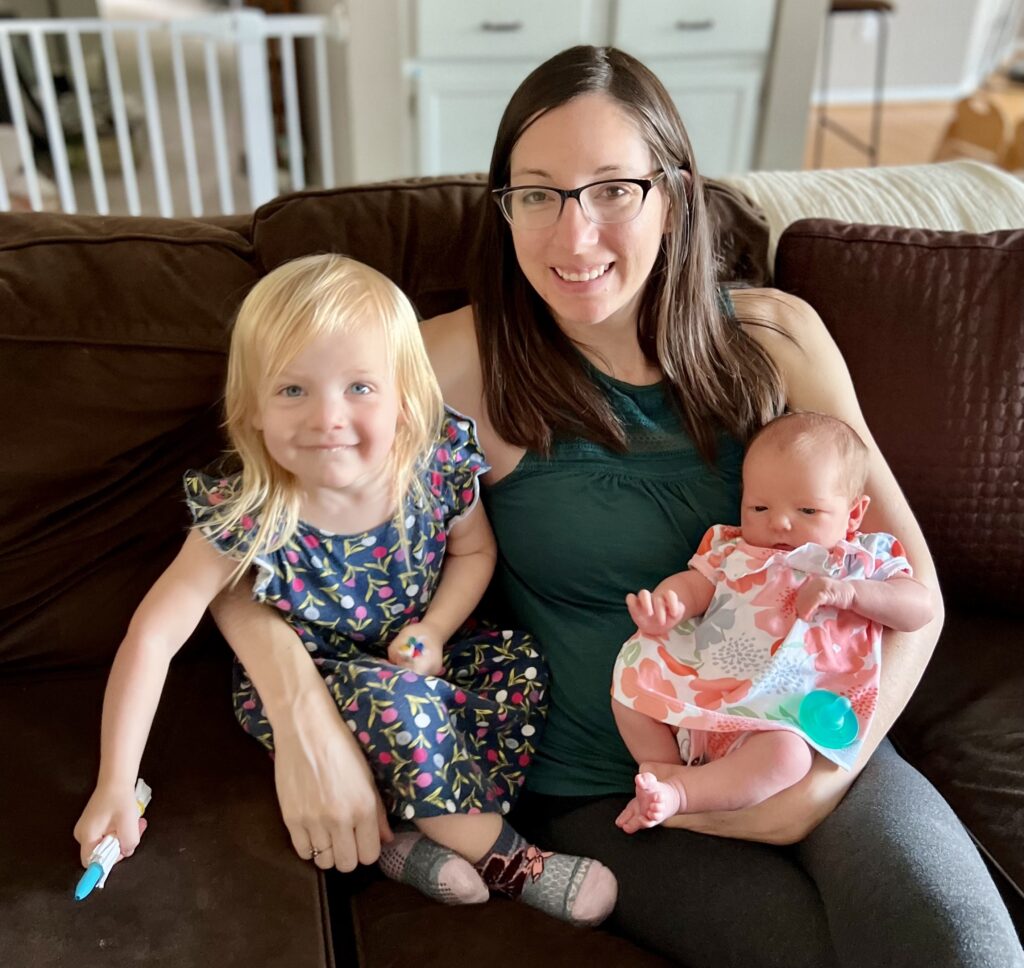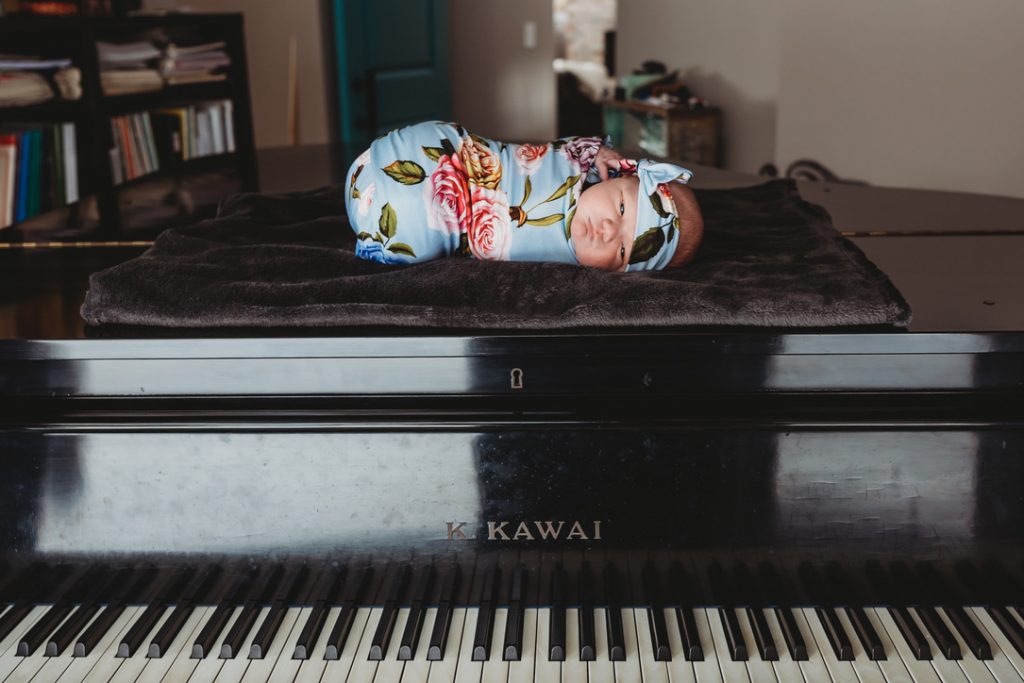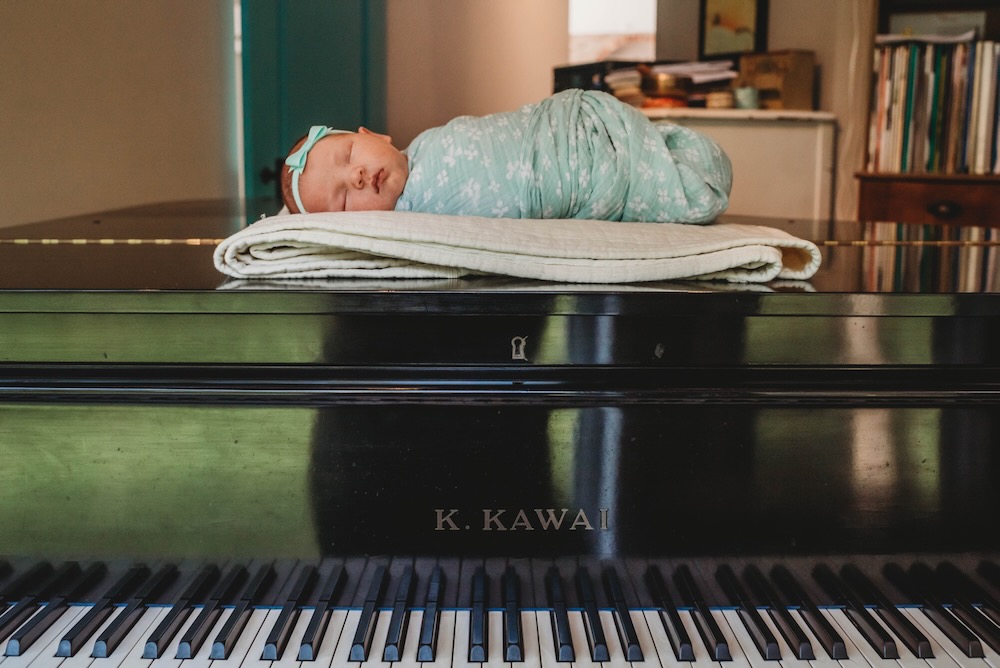
In recent months, I’ve conversed with a few readers seeking thoughts or advice relating to navigating roles as both parents and piano teachers. As I talked to these fellow parent-teachers and started drafting this article, I realized I have a lot to say on this topic. Becoming “Mom” to two sweet little girls in 2020 and 2022 has given me a perspective I’d love to share — particularly for anyone who might be in the same stage of life.
Without further ado, here’s my article with thoughts related to being both parents and piano teachers. Read on for advice regarding purpose, work-life “blend,” childcare, maternity/paternity leave, managing your time, and designing a life you love. Whatever your current family situation, I hope this article has something for you.
Disclosure: This post contains Amazon affiliate links. Thanks for supporting my work!
Know Your “Why”
As the book by Simon Sinek says, “Start with why!” Keeping your personal “why” in focus will give you purpose and energy as you go about your work and family life.
So, consider: why do you teach piano? More specifically, why do you wish to continue teaching piano during a season of raising young children? Here are some examples that might be true for you:
- I teach piano to support myself and my family financially.
- I teach piano because I love being around music and sharing music.
- I teach piano because I love teaching and mentoring young musicians.
- I teach piano because I find it to be a stimulating, fulfilling outlet for myself.
- I teach piano because I want my children to grow up in the musical environment my music studio provides.
- I teach piano because I want my children to see me working and loving my work.
Did many of those “whys” resonate with you, as they do with me?

What’s interesting to consider is that while we’d probably agree that our families and ourselves come first, it doesn’t necessarily have to be an “either-or” when it comes to raising as family (more on this later) and teaching piano. In fact, some of the reasons I teach piano are FOR myself and my family. I love raising my children, AND I also love teaching and am thankful for the way it rejuvenates me. My teaching has informed my parenting, and my parenting has informed my teaching. Both roles make me a better person.
Embracing Work-Life Blend
There’s no doubt about it — parenting brings new challenges. At times, it might feel as if work life and home life are in opposition with each other, conflicting and each tugging for attention. Popular advice recommends seeking work-life balance, but I’d like to suggest an alternative mindset.
Instead of trying to achieve a perfect work-life balance (does such a thing even exist?!), consider thinking of a work-life blend. Work and home life invariably DO overlap, but that isn’t necessary a negative thing. I love the many ways my work as a piano teacher impacts me personally as well as my family, and vice versa. It’s not always going to look perfect, but that’s okay; adjustments can always be made to the blend.
Life is messy. Embrace the blend rather than fight it, and look for the silver linings in the intersection of YOUR work life and personal life.
Stay Flexible as Seasons Change
As I like to say: the only thing that stays the same when it comes to raising kids is things are always changing! This is one of the challenges of parenting, but also part of what makes parenting fun. Every stage of development brings new joys and hurdles that will pass as you transition to the next chapter. Keep this in mind as you savor each happy moment and navigate any frustrating challenges. As everyone says, children grow up quickly! I’m determined to enjoy every chapter of parenthood as I can.
One massive benefit of being self-employed is that you can set your own hours! As your own boss, you can increase or decrease your teaching hours according to the season of parenting you might be in. And you can choose to teach only certain days each week, or take summers off if desired.
When I became pregnant with my oldest, I stopped adding new students (for the most part) to allow my schedule to naturally decrease over the next couple of years. In this season of life raising young children, I’m content to have a smaller studio than I enjoyed pre-kids. I expect that as my kids grow older, at some point I will enjoy increasing my teaching hours once again.
While my daughters are as young as they are (a baby and a toddler) and I am their primary caretaker, the majority of my teaching hours are the evenings when my husband is free to watch the girls. When my daughters become school-aged, it’s possible I might adjust my schedule again to be able to enjoy a bit of time with them when they first get home from school and before I start my teaching day. There are also after-school activities to consider, which my husband and I will need to share facilitating. We will cross these bridges as we get there, but it’s nice knowing now that my work gives me flexibility to do what works for our family.

Creative Solutions for Childcare
When you have a child in your care, there are new considerations to factor into the way you spend your day. Here’s a few ideas for creative childcare arrangements that might compliment your desired teaching schedule as a music teacher.
- If your baby tends to be content most of the time, you might be able to teach lessons while baby is close by in a baby carrier or pack-and-play. I know teachers for whom this worked well and did not work well. So, it may work well for you, or it might not. But it’s an option to try, if desired!
- Trade-off with your partner. If you and your partner agree it’s a priority for you to be able to teach music lessons, arrange your teaching schedule in accordance to the hours when your partner is available to watch the kids. As I mentioned earlier, this is what my husband and I do. It helps that he is allowed to work a 7am-4pm workday instead of 8am-5pm — which means I can start my teaching day an hour earlier than otherwise. In addition, his job currently allows him to work from his home office, which means I can occasionally sneak in a lesson or two during daytime hours. You might also consider teaching on the weekends, especially if there seems to be a market for lessons offered at that time in your locale.
- Consider checking with your family, friends, or students/their parents to find someone willing to help entertain your kids while you teach. You never know — you might find the perfect childcare solution by tapping into your social network! This may require paying a babysitter’s fee, an expense you will want to factor into your decision-making and tuition rates.
Taking a Maternity or Paternity Leave
Here in the United States, piano teachers generally do not receive paid maternity/paternity leave and must decide for themselves how much time to take off from work postpartum. Here’s some advice and considerations for planning your leave.
- If you’d like to keep your income consistent, consider saving up for your leave in advance. If possible, set aside a portion of your income during the months preceding baby’s due date to help cover your planned time off work. I was fortunate to be able to set aside enough income to allow me to continue contributing normally to our family budget during my maternity leave, which provided a great deal of peace-of-mind.
- Consider putting together an optional packet of activities to sell to your students to keep them busy during the break from lessons. The income generated can help cover the lack of income during your leave. (I haven’t tried this idea myself, but I’ve heard of other teachers having success with this!)
- Consider hiring a substitute teacher to fill in for you during your leave or passing along names of other local teachers your students can take lessons from for a time. Some of your studio families may wish to enjoy a break at the same time you do, but others may wish to continue lessons. Recognize that there’s a chance some of those students may end up switching to another teacher, but if you are actually hoping to downsize your teaching schedule this might be a win-win.
- In the months preceding baby’s arrival, notify your studio families about the time you plan to take off from teaching lessons. When deciding how much time to take, keep in mind the income you might need to support yourself financially and the time you’ll need to recover physically and mentally — plus to learn the rhythms of caring for a baby. All these factors play into the well-being of you and your family, and there’s no “right answer” here. You might decide to take 6 weeks, 10 weeks, a semester, a year, or more. It’s up to you! And, of course, no one will be holding you hostage to your plans. If you later decide you want to return to teaching earlier or later than planned, you can always change your mind.
- Do what you can to prepare yourself and your family before baby’s arrival. There’s no way to be completely ready for early life with baby, but consider reading a parenting book or two so you have at least a general idea and some strategies ready. Ask other parents about their favorite books and baby gear. (Check out my favorites here!) Prepare your home with the items you’ll need when baby arrives. Consider making some freezer meals. I tend to be a planner when it comes to most things in life, and I’m always grateful for whatever preparation work I’ve been able to accomplish when it comes to entering each new stage as a parent.
- Make it a priority to take care of yourself as well as your family during your leave. The early weeks with a newborn can be particularly challenging, especially when you are sleep deprived. Take naps when you can (even if you are “not a napper,” like me!). And don’t hesitate to accept — and request — help from friends and family. Receiving a meal, help with errands, or the gift of a couple of hours to take a nap or shower is helpful and meaningful. In the future, you can always return the favor or pass it forward to other new parents. We aren’t designed to live in isolation and, as they say, it takes a village to raise a child. It really does get easier as you learn the ropes and as baby gets older. You’ve got this!


Simplify and Streamline
When you are a busy parent and professional, you might find no longer have the luxury of spending time the same way you did pre-kids. As some point, it might be time to “think like a CEO” and find ways to simplify, streamline, or automate certain work and home tasks — especially administrative elements. Below are a few ideas to get you started.
- Consider charging tuition as a flat monthly rate. This was hands-down the best piece of advice I received after graduating from college and relocating my studio. Unless you have a health condition or some other reason you need extreme flexibility on your end, I generally recommend this to any independent music teacher. It’s easier than you think, and offers so many benefits to both you and your studio families. It helps your families value their time slots with you, reduces missed lessons, makes budgeting easier for both them and you, simplifies billing and bookkeeping, and can help make piano teaching a financially viable career. Check out this article by Chad Twedt for discussion on how to determine your flat monthly tuition.
- Set up auto-billing for your studio families. Doing so means no more creating invoices manually, and no chasing down tardy payments! The two platforms I use for this are Coinhop and PayPal. Stripe is another trusted option.
- Related to the previous point… Look for more tasks you can outsource, especially for work you don’t particularly enjoy. This might mean investing in platform subscriptions to help automate or streamline admin work, or paying someone to handle things like data entry, bookkeeping, scheduling, or emails. Or, it could mean hiring help for household tasks such as cleaning, meal planning, grocery delivery, lawn care, etc.. For certain tasks, you could even consider hiring your own kids when they are old enough! You know how much your own time is worth hourly, and you might find that adding just one or two additional students to your teaching schedule gives you enough extra income to take your least enjoyable tasks off your plate. That, in turn, could give you more time to spend with your family — which is invaluable.
Love What You Do, Do What You Love
We have but one life on this earth, and there’s much within your control to design your life the way you wish. If you are like me, you love both parenting and piano teaching. There’s no reason the two can’t weave together beautifully. And I know I’m giving a gift to my children by giving them a rich musical environment to grow up in and modeling a happy home-work blend in my life.
Here’s to creating a enjoyable blend of family life and work as parents and independent music teachers! Let’s strive to do what we love, and love what we do.
Your turn: What resonated with you? Or what would you add? What advice would you offer fellow music teachers who are new parents or parents-to-be? Please share your reactions, experience, or memories in the comments below.
Related:
- Early Childhood Music with my 17mo Daughter, by yours truly
- How Motherhood Changed the Way I Teach Piano (Piano Teacher Confessions), by Rebekah Maxner
- Teaching My Own Children to Play Piano, by Chad Twedt


Great article! A lot of this resonated strongly. I was incredibly sad to hit the pause button on teaching two years ago. After the Covid restrictions eased up, I suddenly had my husband back working in the office, not coming home til 9pm, and my kids joining travel soccer teams and ballet groups. I felt a lot of pressure to give my own kids back all the things and events they had missed out on, but at the sacrifice of my business. I’m enjoying this stage of motherhood, but I’m wistful about my teaching days. Looking for courses or researching projects so that when I am able to teach again, I’ll be more than ready.
So glad to hear it resonated, Jenny. I imagine that was challenging deciding to give up your teaching for now, but I’m sure your current stage of motherhood keeps you very busy! Teaching will always be there for you when you decide the time is right!
I can relate… I stopped teaching lessons when my oldest was born 7 years ago. My youngest is now 4 and I just started teaching again. My husband works long hours and I’m the kids’ primary caretaker and I knew I just couldn’t make teaching work while they were very young. They’re old enough now that I feel comfortable taking on a few students (I only have 6 now). With some students, my girls are able to play with the student’s sibling in the other room during lessons. With others, I give my girls headphones and their iPads. It’s not ideal, but we make it work. I’ve thought about doing monthly tuition, but I’ve discovered that weekly tuition works better for me. Just this month, I’ve had to cancel all my lessons two weeks in a row because my kids got sick back-to-back.
Hi Lisa! Thanks so much for sharing your experience!
Beautiful article! So many of these thoughts resonated with me. The work-life blend has always been a challenge for me, for sure, having kids with ages ranging from tween to toddler. However, I truly love being a piano teacher!
Thanks, Marissa! Glad it resonated! I might be picking your brain at some point in the future as my kids get older. 😉
Thank you for this article, Joy. I’ve been through many seasons of teaching and parenting since I’ve taught through all 4 of my kids being born/being young/growing up. What I’ve realized is that I have to assess where we are as a family each season and tailor my lesson schedule to what works best for my family. Several years ago, I cut my yearly lesson schedule from 32 lessons a year to 25 lessons during the school year. Teaching just 10 weeks in the fall and 15 weeks in the winter/spring isn’t “a lot” – but it also makes the piano schedule SO much more doable for my family. I know that I have enough “flex weeks” so that I can cancel a week if kids are sick and not worry about still being present for the 25 lessons I committed too. Monthly tuition has been so good for my studio as well. My kids are now 14, 12, 8 and 6 – and I’m proud to say that I’ve taken time to prioritize my family as well as blending my goal to continue cultivating and teaching a studio. When my oldest were little, teaching right after school worked well! Now, I want time during the weeknights to be with my kids after school, so as of next year, I will limit my teaching to only one weeknight a week as well as daytime lessons for homeschoolers and online lessons. My studio hovers around 25-30 students, which is just right for me. I take most of the summer completely off, except for my scheduled “Reading and Writing Book Club” meetings. Work hard and play hard is my motto!
Thanks so much for sharing your experience, Sarah! It’s great to hear what’s worked for you over the years!! I appreciate hearing all the specifics. 🙂
Just a note to say I stopped using Paypal after they kept my money for a week with some bogus irrational reason. Seems I did find they were in a big spending need so perhaps keeping people’s money padded their bank accounts…I don’t know but I am done with that creepy game.
Sorry to hear about the trouble with PayPal, Patricia! I know in other countries, making payments to others is an easy matter from bank to bank. I really wish the banks here in the U.S. would get with the program and do something similar so that we don’t have to depend on companies like as PayPal and others!
As always, I really enjoyed your article, Joy. You are always chock-full of great ideas. ? Thank you!
I’ve had problems with PayPal too. I personally love Zelle, and all my clients pay me that way. I believe that would be considered a bank to bank arrangement, yes?
Thanks, Laurie! Glad you enjoyed it!
Yes, I would consider Zelle a bank-to-bank arrangement. I think it’s a great option, and hooray for no fees! Unfortunately, my bank does not yet offer Zelle for business accounts; only for personal use. 🙁 So, it depends on which bank you use.
The other consideration is that while you can send and request payments with Zelle, I don’t believe you can set up auto-payments. But if auto-payments aren’t something you need, I think Zelle is an awesome option! Thanks for mentioning it, Laurie!